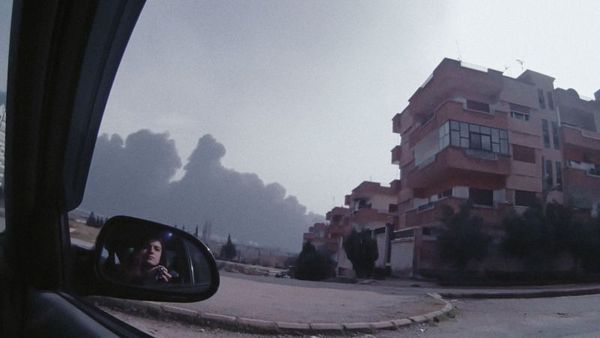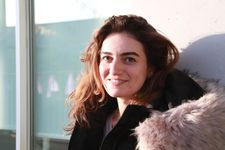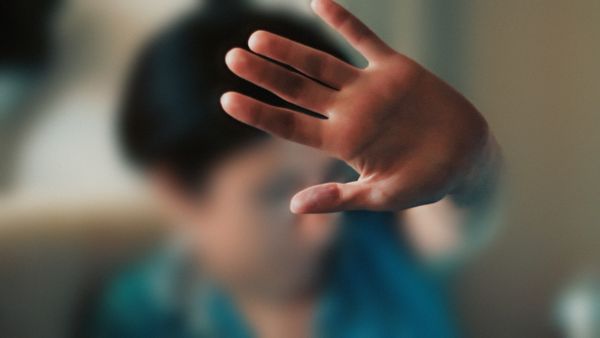This must have been a real challenge to edit because it was your lived experience of being in Syria at that time. How did you adopt a directorial distance from the material?
The years helped, the time really helped a lot. When I first started editing, I was still shooting back in 2012. And obviously, the kind of film I was making back then is very different from what we ended up doing. The time passing helped a lot with the distancing. Also being away from the country helped a bit as well, just because you get to detox a bit from all the adrenaline and that also took a few years. It was a very long process. Also, yesterday, I was asked in the screening by some Syrian friends why I had chosen to do the voiceover in English. That was also a tool I had used to distance myself a bit - it was really useful to write in English instead of Arabic.
Did it help as well that everyone involved had moved on to a different position in their life?
That also was one of the reasons why it took so long to finish the film. Right after we ended shooting, I still felt that these stories weren't necessarily over yet, and that they were still going through a process, that they were still developing, they were still not sure in which direction they were going. I wanted to wait a bit longer to hopefully find a point where they stabilised a bit more. So I kept following the story, in a sense, even when I was not shooting. It took some years for them to process and for me to process. We finally reached a point where we said, okay, there is no clear cut traditional end to the film, but at least here we can draw a line and say, yes, this was the status of this moment.
These people are still trying to survive, they're still struggling. The thing is, it is a 90 minute film, but if I would compare it to the lived reality, I would call it a trailer of what happened. There was so much more happening that we could not include in the film, even things that we had the footage of, but you can still only tell so much in one film. And there were so many other people involved. This group is just a small sample of thousands and thousands of other people. And none of these stories are over. But you have to finish your film.
I presume by keeping it narrow, it also helps you to preserve the anonymity of those involved.
The less connections you make, the less possible it is for people to figure out. There were many elements of the story that we had to cut out in order to protect anonymity. It wasn't only like technical changes in the edit, it was also in the narrative. There were lots of advanced connections and activities that we had to keep out to prevent people from being identified.
Technological advancement has been great for this film in the sense that you are able to use deep fake technology for one person in the movie. How did you work on that?
It was a huge risk, because the technology is advanced but you're not sure what the what the result is going to be and it's also a huge investment, because it takes a lot of work, a lot of time, a lot of funds, and then a lot of work to raise the funds. I would say we were lucky, because when we started shooting the film, there was no such technology yet available. And for years, we were trying to find a solution.
One of the great things about deepfakes is that they allow intimacy to be retained. It reminded me of the use of it in documentary Welcome To Chechnya, where you can see how good it is as they reveal some of the identities near the end.
We watched that film, actually, when we were considering the deepfake technology.
It must have been reassuring.
It was. There had been previous attempts before that to anonymise faces with advanced masks but they were very complex in the sense that they had to be planned in ahead. So the characters, while being filmed, had to wear some sort of mask that the machine could match to. So it's not something you can add in post so it was not an option for us. I'm really glad it made it in time. Although, of course, I am very much concerned about the technology and other uses.
It stood out for me that you acknowledge the sort of privileged position that many people in Damascus have been in, at a distance from the terrible massacres, and maybe a little bit protected. We've seen an awful lot of films about Aleppo or Homs, which you touch on in the film, but there's been a lot fewer about the situation in Damascus. Was that something that you really were conscious of trying to bring home?
Definitely. Coming from the news industry and journalism, I know that the headline focus is always, “if it bleeds, it leads”. They go to the battles, they go to the frontline, and it's never the full story there. The battle is a peak. It's not where things begin, and it's not where things end. So I think for me, it was very important to tell that untold story. The more documentary films came out from Homs and Aleppo, the more relieved I felt, because I thought, “Okay, that story has been well covered. I can now really focus on this one.” It was helping me really crystallise the film, because other stories were being covered and my film was not as burdened any more.
One of the motivations for me to focus on a multitude of characters in the film and tell different stories is because different people make different choices. So Susu did not show leave. For her leaving would have been a defeat. As long as she's surviving somehow there, for her that's already a lot more than the rest of us are doing, in a way. She just has such an organic, intrinsic gut-wrenching relationship with the country. She's a fish out of your water, if she ever leaves. Whereas for me, for instance, I found, even as a journalist, I reached a point where my hands were tied from the inside, and I felt that I could have a bit more liberty and reporting if I was on the outside. At least I would have a more even head to process things. And I could not have finished and gone out with this film if I had stayed inside. So, some people make the decision based on the different circumstances, on what they can and cannot do. Others don't have a choice, they had to leave. Part of the privilege that we had in the group was that we could choose, we still were able to make these decisions. Most people didn't.
You adopt multiple personas in the film and one of them is in a much more privileged position than all the others. Do you think that's still the case in Damascus, that there's a sort of level of privilege for people there?
It's definitely nothing like it used to be. For me, on a personal level, between my first and my last arrest the experience was completely different. And it got worse and worse. There's just this total impunity, a total lack of accountability now. There's a complete loss of faith in journalism, and what it can do. Because it's not like it wasn't well covered. It's not like people didn't know what was happening, it was literally broadcast live. It's highlighted, in a very extreme way, the limits of what journalism can do.
I noticed there’s a very clever thing you do in terms of the filmmaking. When you’ve been in prison the second time you use a black screen and when you come out you flood the screen with light in order that the audience has a real physical reaction to that.
The fact that you have these gaps in your footage in situations that you just cannot physically film no matter what, you have to come up with creative solutions to make up for that. And if you can't show what happens, at least you can transmit the feeling. We also had an amazing team working on the sound edit that really constructed the scene. Releasecan be overwhelming. It can take a while for you to actually realise I am out, it happened, it’s over. It can come as a shock and it can be harsh. Like Rima says, it’s also beautiful.
I feel watching your film that nobody really expected things to become so fragmented in terms of the oppositional elements that grew up in Syria, the extremism.
Of course not. It was so crystal clear when it started, it was obvious what this regime is. There was no logical argument for supporting the regime. But with these kinds of conflicts, the longer it lingers, the more complicated it gets, with areas going out of regime control, it’s the perfect opportunity for so many devils in the world. I mean, mercenaries, the war industry. It becomes the playground of all the evils in the world. They run to the party, basically. It's their golden opportunity.
Another aspect that is often overlooked is the urbicide that took place - Homs was an example. In the film, there are a few scenes where you see, from my window, an open space, more or less, where the buildings aren't very high. This area used to be the Greenbelt of the city. For decades, the regime had been trying to get an urban plan to clear that area out and create a huge park and then fancy houses, and the local people there were resisting. And the regime wasn't able to carry out this plan. So when the revolution happened, obviously, these people had lots of issues with the regime, so they went out to demonstrate. Then the regime used that excuse to retaliate completely disproportionately against them. And now this area is a desert, it's flat on the ground, there's not a single tree or house for kilometres.
What do you think people in the West could do to improve the situation?
The biggest problem is that there is absolutely nothing special about Syria. This is just another case of so many other examples, manifestations of the same huge global systematic problems, whether it's the war industry, whether it's UN corruption, whether it's UN Security Council, whether it's well, basically what Russia is doing is neocolonialism. You know, the big fish playing around the smaller fish, smaller countries are less and less independent every time. Puppets, dictators, the list goes on and on. If this happened in Syria, it can happen anywhere else next. If the war in Syria caused a refugee crisis all over Europe, what is the world going to look like when this hits Egypt or hits India? If these perpetrators can completely get away with all this in Syria, they can do that anywhere else. And I don't know how many more Syrias the world can handle.
Watch a clip from the film below
























